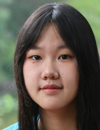
Aurora Xinyi Liu
Asia Pacific Chapter Chair
Aurora Xinyi Liu, a student from Beijing, is brave to face the challenge of lymphedema disease. She is the daughter of a lymphedema patient. Her mother underwent surgery for a gynecologic tumor in 2018, then diagnosed with lymphedema. Aurora realized that the tragedy was due to lacking prevention information from health care providers. She also learned that in China, the incidence of lymphedema after breast cancer surgery is 20 to 30 percent, and the incidence of lymphedema after gynecological tumor surgery is as high as 40 to 50 percent.
In July 2021, Aurora launched China’s first public welfare project about lymphedema, “Lymphedema Care Action,” aiming to help female cancer patients prevent lymphedema after the operation. Her initiation called on the government, medical institutions, and the whole society to pay attention to lymphedema. Aurora planned and organized experts to write the first "Concise Protection Manual of Lymphedema after Female Malignant Tumor" in China and distributed it across the country. By April 2022, 10,000 copies of the manual had been distributed to hospitals in Beijing, Shanghai, Shaanxi, Jiangxi, Hebei, Inner Mongolia, Qinghai, Gansu, Xinjiang, and other provinces and autonomous regions, providing guidance and help for the prevention of lymphedema for many female cancer patients.
In March 2022, Aurora surveyed 200 female lymphedema patients from 30 provinces in China. She investigated mainly two aspects: first, the quality of life of patients with lymphedema, including the financial burden caused and the impact of lymphedema on daily work; second, patients’ awareness of lymphedema prevention knowledge, medical institutions’ instruction, and education of lymphedema prevention to patients. The data revealed a frustrating truth: most patients received zero knowledge before lymphedema symptoms in all provinces, both in the city and countryside. Lymphedema brings great pain to patients physically and mentally. Nearly 20 million people in China are affected by lymphedema, with hundreds of thousands of new cases occurring yearly. Based on the data collected through this survey, Aurora wrote a survey report on Chinese female patients with lymphedema and submitted it to the government departments, industry associations, and medical institutions. She hopes the report could call on our society’s attention to lymphedema, strengthen the prevention of lymphedema, and reduce the economic burden of patients with lymphedema.
Aurora has directed a documentary film on lymphedema from medical and social innovation perspectives. During the process, she has interviewed doctors, patients, scholars, and public welfare activists at home and abroad for nearly a year to explore lymphedema as a medical and social problem. Her focus remains on education and advocacy from the perspective of lymphedema families.
